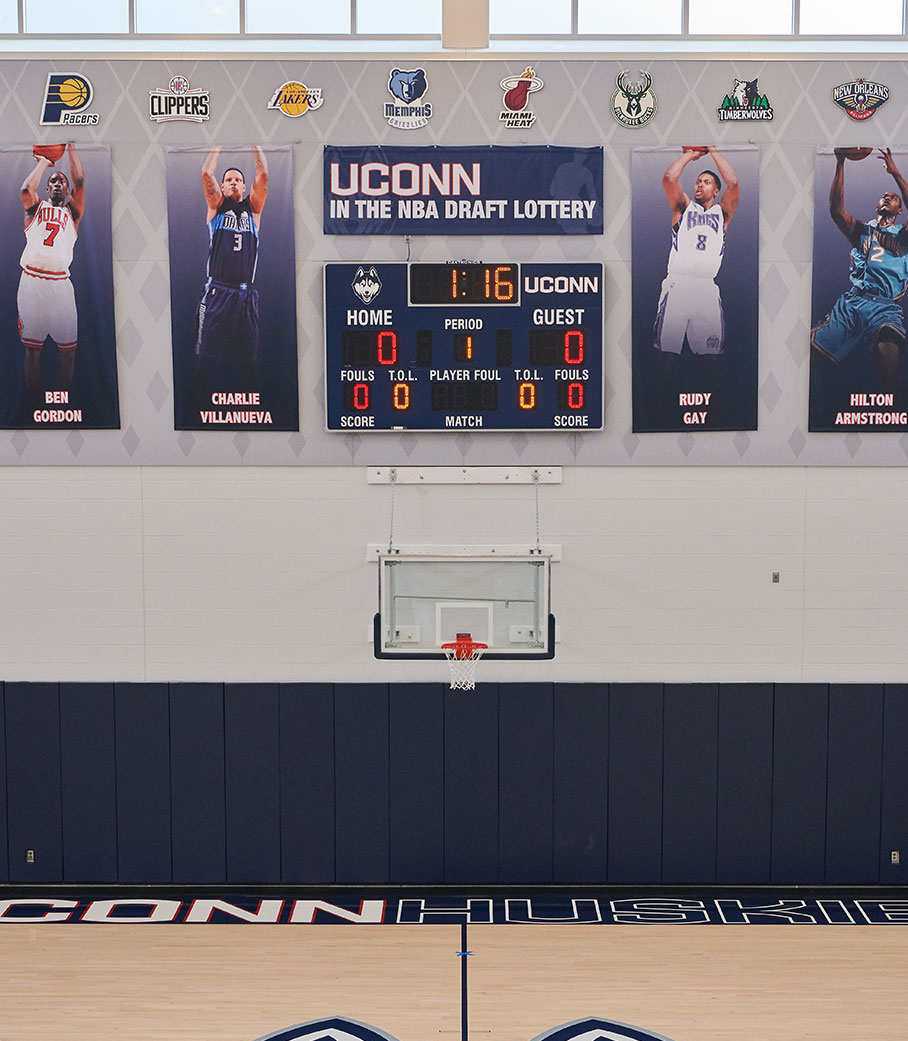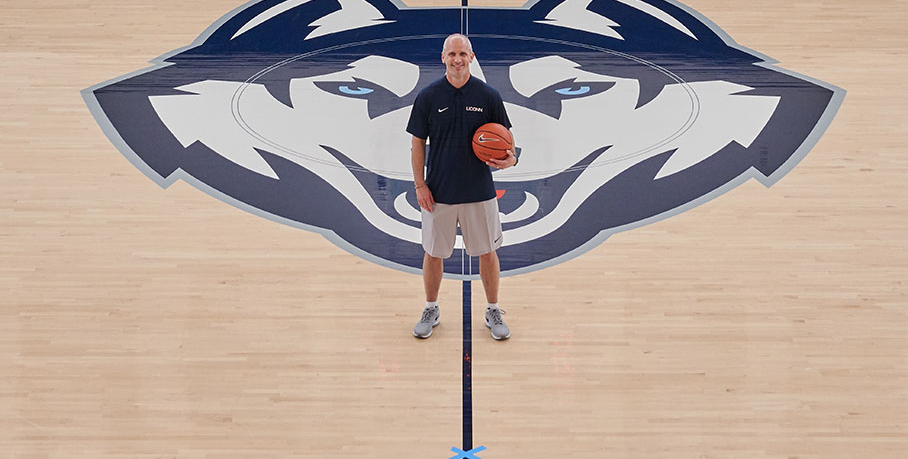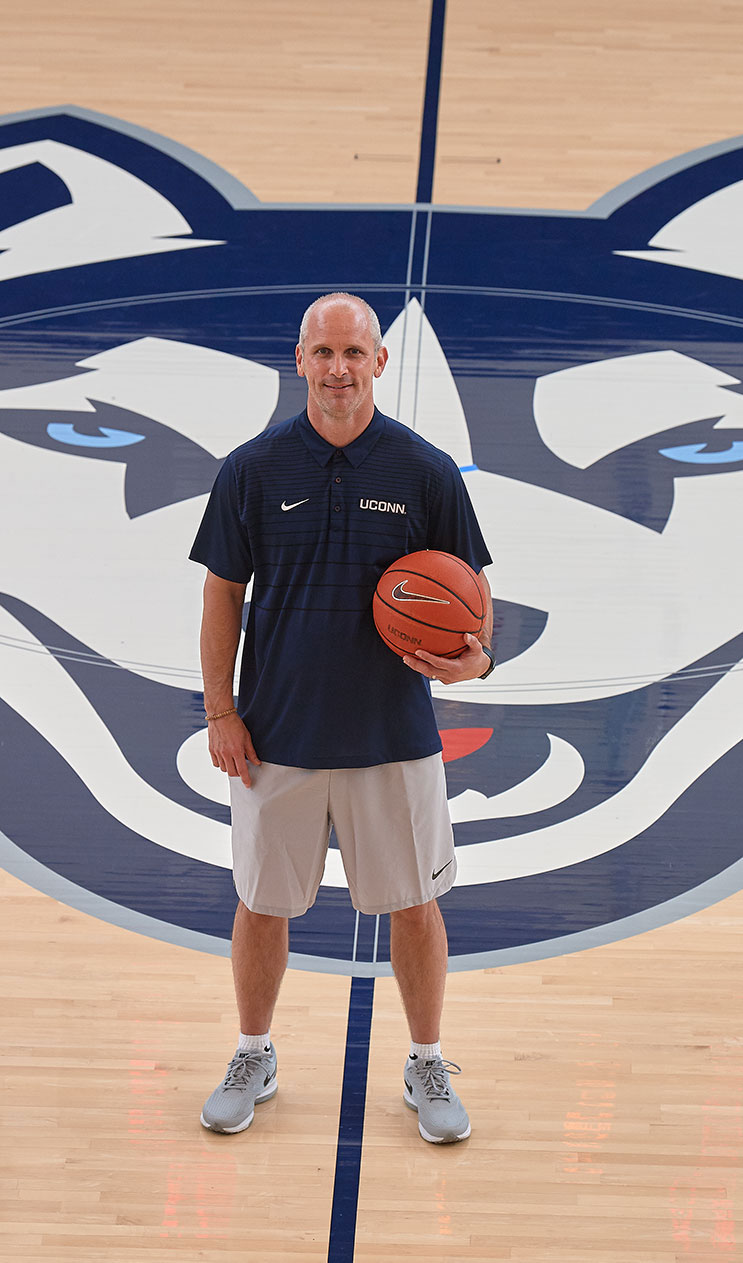What's
Next
"My expectations are higher than those of the most delusional fan," says Dan Hurley, the new men's basketball coach.
By Elizabeth Omara-Otunnu
Photos by Peter Morenus


Just watching a Dan Hurley workout is exhausting. He's constantly on the move, gesticulating, goading, galvanizing his players. He doesn't wear a whistle. He wants the players to keep moving, switching seamlessly from one drill to another, heeding instructions on the fly, making the most of every NCAA-allowed minute.
These hourlong summer workouts are intense and highly competitive. There are winners and losers. Scores are kept and posted in the gym, the locker room, and the weight room for all to see. Hurley seems to notice every detail of every individual, and not just their basketball skills. He's observing pace, effort, and demeanor as well, and has even called out a couple of guys for being poker-faced. If you're on Coach Hurley's team, you need to show your passion.
While he's intent on preparing his current players for the upcoming season, Hurley also has an eye to the recruits who come to Storrs and watch a workout, knowing it will appeal only to those who are ready for that level of intensity. "If you're a competitive player," he says, "you'll love this kind of environment."
Embracing the Hurley way is the one condition he laid out when, little more than 24 hours after he decided to accept the position of head coach at UConn, Hurley met — alone — with his new team in the locker room at the Werth Family UConn Basketball Champions Center.
The players were demoralized from a second losing season and uncertain about their future. Addressing the 10 eligible to return, he told them things were going to be different, but they would have to allow him to coach and that would mean being hard on them.
Minutes later, beneath the championship banners on the practice court, Hurley was formally introduced to UConn Nation as the Huskies' new coach. The future of UConn Men's Basketball had begun.
The Power of the UConn Brand
Hurley inherited a UConn program that had lost its way coming off the era of Hall of Fame Coach Jim Calhoun and struggling to adapt to new conference realities, despite winning its fourth National Championship under Kevin Ollie just four years ago.
But, he says, he likes to fix things, and it would be hard to find a coach with a résumé better suited to the task. The son of Hall of Fame high school coach Bob Hurley ("I learned 95 percent of what I know from my dad"), he scored more than 1,000 points as a point guard at Seton Hall, coached four years at Rutgers as an assistant, nine years as head coach at St. Benedict's prep school, and is entering his ninth year as a Division I head coach after stints at Wagner and the University of Rhode Island.
He has a track record of building or rebuilding programs. He transformed St. Benedict's into a national high school basketball powerhouse; turned Wagner around in just two years; and in six years led the struggling Rhode Island Rams from just seven wins the previous season to an Atlantic 10 conference championship, regular season championship, and two consecutive trips to the NCAA Tournament.
Hurley, long familiar with the UConn brand — both as a player on a rival Big East team and as a high school coach whose players were sometimes recruited by Coach Calhoun — says being the Huskies' coach is his dream job. Though the brand was forged during the glory days of the Big East, he is determined to both carry it forward and reshape it, blending UConn tradition with Hurley family reputation. "We're going to build a program so strong that conference affiliation isn't what the fans or the media are talking about," he says.
While others will doubtless measure his success based on Final Four appearances, championships won, and the number of first-round NBA picks he produces, that won't be enough for Hurley: "I measure myself that way too — I'm as competitive as anyone you'll ever meet — but I measure myself by the impact I have on my players' lives."
In a rare still moment, Hurley crouches under the basket to watch players during a summer workout.
In a rare still moment, Hurley crouches under the basket to watch players during a summer workout.
Building a Championship Culture
Hurley wasted no time starting to build the program — getting to know his players and reaching out to their families, the academic advisor, and the athletic trainer in an effort to understand his team.
No player left, and none was asked to leave. No matter that he hadn't recruited them. "My relationship with players is about trying to transform the people that you meet," he says.
The players believe in his ability to lead them forward. "He came from a winning background," says junior guard Christian Vital. "Every place he went, it was struggling to begin with and ended up in a better place because of him."
After watching video of more than 20 of last season's games, Hurley picked out clips where he felt the players weren't aggressive, or played selfishly, where they were out-rebounded, or allowed the other team to dictate the game. That's never going to happen again, he told them.
He filled the three open scholarships with two graduate transfers and a freshman he had previously recruited to URI, chosen not only for their talent but for character and work ethic as well. One of the graduate students, Tarin Smith, played for Bob Hurley Sr. in high school.
And he set out to hire "one of the best all-around staffs in the country." In short order, he named three assistant coaches, selected for their all-around skills and "head coach quality." Kenya Hunter, Kimani Young, and Tom Moore are experienced Division I coaches with long-standing networks of relationships that between them cover the key recruiting areas of New York, New Jersey, New England, and the mid-Atlantic.
Strength and conditioning coach Sal Alosi was brought in to develop a 24-hour wellness program, while former UConn standout and 2004 national championship point guard Taliek Brown was hired as director of player development. Brown also is tasked with strengthening connections with former Huskies, a process Hurley kicked off soon after his arrival by sending about 500 personal letters introducing himself to the program's former players and student managers.
Hurley wants everything that touches his players to contribute to the championship culture he is aiming for, and there is no detail too large or too small for his attention."If we have Final Four aspirations and championship goals, everything has to function at a high level," he says, "from our facilities, to the way we're marketing the program, to our academic support program."
With so much to be done, the new coach's days begin at 5 a.m. — with meditation, prayer and Bible reading, journal writing, and an hourlong physical workout before he even begins his commute to Storrs (90 minutes each way from Rhode Island for most of the summer). From workout to the weight room to media interviews to meetings with administrators, followed by a huddle with his assistants in the conference room, he doesn't stop. Not even for lunch — instead he brings healthy snacks from home.
But he does recognize that he occasionally needs to press the reset button. And when the shades are drawn on the door to his office, his staff know not to disturb him. He finds meditation, part of his practice of Thai yoga, helps him think more clearly. "I'm making so many choices during the day that will have such an impact on so many people," he says, "I've gotta have my mind right."
"The Workouts are Intense, But We Know It's Going to Pay Off.""“Christian Vital
Creating New Habits
As the summer days and weeks lengthen into months, the Huskies are practicing hard, eating better, sleeping more, and growing closer as a team. The new conditioning regime has some beefing up, others slimming down, and all looking toned and fit. Thanks to a sleep tracker on their phones, they are monitoring their own sleep, aiming to get the eight hours a day recommended by "Coach Sal." And they are all doing better at eating three meals a day.
"Paying attention to the small things now is going to amount to achieving our bigger goals as a team," says senior guard Jalen Adams. "The workouts are intense," says Vital, "but we know it's going to pay off."
"We're trying to put ourselves in the best position possible, physically and mentally," says point guard Alterique Gilbert, a former McDonald's All-American who missed two years in a row due to injury and is still rehabbing this summer after shoulder surgery. Hurley and his assistants are working with him individually, to get him up to speed and build his confidence without prematurely exposing him to contact.
Gilbert says Hurley is a very hands-on coach. "He's such a great leader. He knows exactly what to do and when to do it. He pushes you in a way you still feel motivated." The players agree that Hurley is tough but say he takes the time to explain what he's doing and why. "He's gonna tell you the truth, whether that's good or bad," says Gilbert.
Hurley also holds his players accountable. "If you mess up, he's not going to let you get away with it," says Adams. "He lets the whole team know, and the whole team has to come up with a way to resolve it."
When Coach rips into two players for slacking on sprints — the sprints themselves being a penalty — two of their teammates call the entire team together for an impromptu players-only meeting to discuss the situation.
Hurley demands nothing less of his players than to be the best they can be in everything. It's not just about competing and performing every single drill at the highest level. It's also about going to every class, earning the highest grades they're capable of, and even standing out among teammates in community service with youngsters: "Be the player the kids remember most," as he puts it.
"Our job is to educate the guys for the 40 to 50 years when they're not playing basketball," says Hurley.
"All the coaches are on us about having more to our identity than basketball," says Adams. "They say, 'When basketball stops, who are you?'"
One of Hurley's strongest messages is the importance of constantly learning and growing. "Better, smarter people make better players," he says. To that end, the coach — who taught history at St. Benedict's and aims to read a couple of books a month in his spare time — launched a team book club.
When he handed out copies of the motivational book Chop Wood Carry Water: How to Fall in Love with the Process of Becoming Great, it prompted some sideways glances. But when players, coaches, and staff gathered on the practice court around the Husky dog logo for the club's first meeting, Hurley says he was "blown away" that every single player had read the set passages and joined actively in the discussion. Little more than two months since he'd taken over, there already was a different mindset on the team.
"Everybody's buying into the process of what we have to do to be successful," says Gilbert. "It's definitely a different vibe. In just a couple of months, it's crazy he's had that big of an impact."
"Better, Smarter People Make Better Players."
The Climb Up
It was Hurley's father, a probation officer as well as a coach, who taught him how to use sport as a vehicle to achieve a better life. "The things you learn about yourself in sports, the habits you develop, the work ethic, competitiveness, how to interact with people from all backgrounds, the skill set, can all help you become a successful person," says Hurley, who knows firsthand the ups and downs of a college basketball player's career.
Like many of his players, he and his older brother Bobby were raised in the inner city — specifically the schoolyards, streets, and parks of Jersey City, and on the basketball court of St. Anthony under the watchful eye of their father, Bob Hurley Sr., Naismith Hall of Fame coach.
But after a highly structured childhood and high school career, he says he lost focus during his early years as an undergraduate at Seton Hall. On the court, he struggled to live up to the Hurley name and was stung by the fans' belittling comparisons to his brother Bobby, a four-year starter and two-time national champion at Duke who was then a rookie with the NBA's Sacramento Kings. Early in his junior year, he says, he hit rock bottom and took a leave from the team, heading home for winter break unsure whether he would even go back to school.
Then Bobby was almost killed in a car accident. "He could have died," says Hurley. "That was perspective right there. I had been losing my mind over not playing well, but life is a lot bigger than that."
So he returned to school, rejoined the Pirates as a redshirt, and began the climb back up. The following season he began playing for a new head coach, Jersey City native George Blaney, who would later move to UConn as associate head coach under Jim Calhoun. "Coach Blaney cared about me as a person," he says. "He believed in my talent as a player. He worked so hard with me to get me right. He taught me there could be love there."
In his senior year, Hurley found love outside of basketball as well. He met his future spouse, Andrea (now his wife of 21 years and the mother of their two sons).
With his confidence and passion for the game restored, Hurley finished his college career with 1,070 points, and could have had a promising career as a professional basketball player. But he had found his calling elsewhere in the sport: "I knew, after all the things I had been through and learned as a player, that I could best use my skills as a coach."

The logo is the spot for huddles and team meetings, including weekly book club. "Our job is to educate the guys for the 40 to 50 years when they're not playing basketball," says Hurley.
Can We Shock the World Again?
So where will Hurley's coaching skills take UConn? The Huskies are hungry and so are the fans.
"We definitely want to be a tournament team. And I want one of those," says Gilbert, with a nod to the signed 2014 championship basketball on display in Coach's office.
But no one has higher expectations than Hurley himself. "My expectations are higher than those of the most delusional fan," he says. "I came here to challenge myself. I want to be an elite coach, and bring UConn back to the elite level."
As the weeks count down to the 2018-19 season, he vows there won't be a team in the country that will play harder. "They'll be a strong team, communicating with each other, having each other's back, motivating each other. Those are things we can control," he says.
No one knows how far they will go. But, says Hurley, "my goal is to be the surprise team of college basketball this year."
Bonus:
Watch this!
Ball movement. Selflessness. Execution. ðŸ¤ðŸ˜‚#ThisIsUConn // #DoMore pic.twitter.com/lHKNHRWpBN
— UConn Men's Hoops (@UConnMBB) September 3, 2018

Leave a Reply